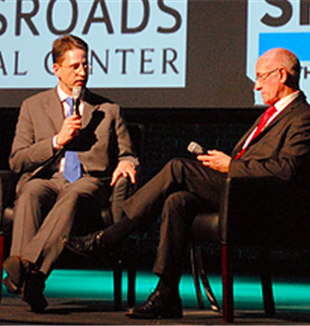
Rémi Brague: Albacete Lecture 2016
I feel quite certain that Msgr. Lorenzo Albacete was “wagging his tail,” as he used to say, when he looked down on the packed theater at the Sheen Center for Faith and Culture in New York City...I feel quite certain that Msgr. Lorenzo Albacete was “wagging his tail,” as he used to say, when he looked down on the packed theater at the Sheen Center for Faith and Culture in New York City for the inaugural lecture that we at Crossroads Cultural Center have named after him. We were honored to have the illustrious Prof. Rémi Brague as the main lecturer, with an introduction by His Eminence Roberto Gonzales, who came all the way from San Juan, Puerto Rico to honor his long-time friend by recalling to mind Monsignor’s reaction to the September 11, 2001 attacks on the World Trade Center.
If there was ever any doubt that an intellectual of our time could be a believer in Jesus Christ and His Church, this lecture dispelled it. Prof. Rémi Brague’s reflections on the origin, relevance, and aim of the Christian culture in a time of epochal changes was truly a witness to the intelligence of faith and the necessity of humility, two elements that were characteristic of Albacete’s life.
Msgr. Lorenzo Albacete was a deep thinker, yet very much a part of the world around him. He loved “West Side Story, “ fried chicken, fountain pens, and his former parish on the Lower East Side of Manhattan, St. Mary’s, where the following day, a memorial Mass was celebrated. I was asked to say a few words, and had prepared a few anecdotes, but the priest at the Mass did not know Monsignor, and had barely made mention of him, so it was difficult to comment on a person who had not been introduced. (His dear friend, Olivetta, whispered to me, “This disorder is a perfect way to remember him.”) I was also struck by the simplicity and beauty of the families at the Mass, most especially the children. And there were so many of them! What could I say to them about Msgr. Albacete? Fortunately, the reading was the Gospel of the Pharisee and the publican, so I immediately thought how Monsignor was the anti-Pharisee. He could relate to all people—young, old, white, black, Latino, Arab, Asian, rich, poor, believer, unbeliever, saint, sinner, but not the person who completely lacked any humanity, i.e., the Pharisee. Msgr. Albacete was fully human, and had the eyes and heart of a child. It was almost as if Monsignor himself were looking at me, wide-eyed and humble, in these people of St. Mary’s. I did not have anything to say but “thank you.”